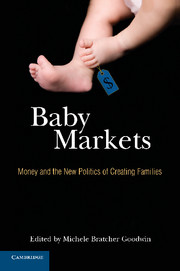Book contents
- Frontmatter
- Contents
- Preface
- Acknowledgments
- Introduction
- PART ONE WHAT MAKES A MARKET? EFFICIENCY, ACCOUNTABILITY, AND RELIABILITY OR GETTING THE BABIES WE WANT
- PART TWO SPACE AND PLACE: REPRODUCING AND REFRAMING SOCIAL NORMS OF RACE, CLASS, GENDER, AND OTHERNESS
- PART THREE SPECTRUMS AND DISCOURSES: RIGHTS, REGULATIONS, AND CHOICE
- PART FOUR THE ETHICS OF BABY AND EMBRYO MARKETS
- PART FIVE TENUOUS GROUNDS AND BABY TABOOS
- 18 Risky Exchanges
- 19 Giving In to Baby Markets
- Concluding Thoughts
- Author Bios
- Index
- References
19 - Giving In to Baby Markets
Published online by Cambridge University Press: 05 August 2012
- Frontmatter
- Contents
- Preface
- Acknowledgments
- Introduction
- PART ONE WHAT MAKES A MARKET? EFFICIENCY, ACCOUNTABILITY, AND RELIABILITY OR GETTING THE BABIES WE WANT
- PART TWO SPACE AND PLACE: REPRODUCING AND REFRAMING SOCIAL NORMS OF RACE, CLASS, GENDER, AND OTHERNESS
- PART THREE SPECTRUMS AND DISCOURSES: RIGHTS, REGULATIONS, AND CHOICE
- PART FOUR THE ETHICS OF BABY AND EMBRYO MARKETS
- PART FIVE TENUOUS GROUNDS AND BABY TABOOS
- 18 Risky Exchanges
- 19 Giving In to Baby Markets
- Concluding Thoughts
- Author Bios
- Index
- References
Summary
I come to the issue of baby markets with reservations. Drawing on a relational conception of autonomy and self-definition, I argue that commodification of reproductive material is intrinsically harmful. Moreover, such commodification poses a number of consequential harms. Nevertheless, in spite of these concerns, I “give in” to baby markets, which is to say I do not argue for the prohibition of these markets, but instead for their regulation and oversight. In other words, I am not willing to accept completely free and unfettered markets. I give in to baby markets in part because of the great impracticality of prohibiting markets given how well entrenched they are. In addition, although markets present risks, the risk–benefit calculus calls for allowing markets to exist, provided there is careful and serious regulation of such markets. Thus I take a pragmatic approach that suggests we should (reluctantly) accept baby markets as long as we offer measures to counteract the negative effects of commodification so that baby markets work equitably, safely, and in a way that protects the interests of all involved: seller, buyer, and future child. In a country with limited regulation of the reproductive industry, this may be a tall order.
In section A of this chapter, I use a relational theory of personhood to suggest that reproductive material can be relationally self-defining to varying degrees. The more self-defining such material is, the more intrinsically harmful it is to buy and sell it.
- Type
- Chapter
- Information
- Baby MarketsMoney and the New Politics of Creating Families, pp. 278 - 294Publisher: Cambridge University PressPrint publication year: 2010
References
- 1
- Cited by



